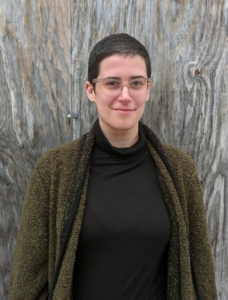Before the Shrine of My Fermentation Cabinet
[creative nonfiction]
Massaging the cabbage takes me back through imagined time, at the table with generations of grandmothers wrist-deep in it. My arms are not so strong as theirs, so I must take breaks. I massage it three times and each time it feels a little softer, like paper crumpled and unfurled till it turns nearly to cloth. I press it into the water-sealed airlock jar my mother-in-law gave me and I place it in the cabinet beneath the sink, beside the kombucha. Over the next day, the cabbage will wilt further, giving up its water to the brine, which will fill the moat in the cap. I crouch before the fermentation cabinet every other morning to check on my SCOBY, the color of my kraut, to smell the bacterial funk, and each time I am transported. To the past, to the future, to the molecular level. I give the bacteria what they need and they give me what I want.
Fermenting bacteria are much older than we are. They have been by our side for all of human history, symbiotic in the most literal co-evolutionary sense. It’s impossible to know, prehistoric as it was, if our harnessing of them was intentional or a quirk of circumstance, but it has kept us alive through times and places we could not otherwise have survived. When I watch my own ferments, it is with awe, with gratitude for my continued existence. It is no coincidence that the community of bacteria living in each of these jars is given the same word as humans: culture. As we work together, they work together.
Still, it is not with an eye towards history that I started my first batch of sauerkraut, and the sense of continuity with the past that overtakes me as I work surprises me. My eyes were on the future. I was thinking of survival, yes. But I was thinking of all the survival we have yet to do. As our earth burns beneath our feet, our options are adaptation or extinction—our unfamiliar situation creates a familiar paradigm, one we have only escaped for a blip of a few hundred, maybe a thousand, years. In place of adaptation, we have pursued comfort and improvement. We have sterilized and controlled every aspect of life. Yes, even fermentation—I started my first batch with a recipe, in a jar designed and sold for precisely this purpose, after reading a book that included a whole chapter on the relative safety and sterility of different types of fermentation vessels. We understand the process almost too well; the Koreans, among the earliest adopters of intentional fermentation, now often outfit their homes with special refrigerators devoted to kimchi, kept stably at the scientifically correct temperature for ideal fermentation. That there are complex kits sold when a jar with a cloth over it would do the trick just fine, says it all. The traditions are alive, but they live in a world that is far more ours, far more owned and controlled by humanity, a world in which we act as the bacteria’s benevolent but overbearing hosts.
This same control that we’ve applied to fermentation, we’ve applied to all of our food, and it drove fermentation into practical obsolescence. What fermented foods we enjoy, in most places, are enjoyed for taste and for culture, not out of preservation necessity. This is no argument against refrigeration—the invention of the icebox revolutionized the way we eat. But it is a signifier of our implacable hunger for forward progress, the hunger that led us to devour our very planet. And it relies on a stability we are likely to lose, the stability that allows us to comfortably assume we will have uninterrupted, unlimited, perpetual electricity in our homes.
It is with an eye towards the future that I am learning to ferment. It is out of the same fear that stops me from eating meat, that keeps me in semi-darkness while I have perfectly functional lights, that makes me question my reproductive biological mandate. While I massage my cabbage, which I did not grow myself, which I bought from the grocery store with no knowledge of its origin, I expected to feel forward continuity. I am not sure whether to feel comforted or worried that it is not what I found.
Hannah Suchor is a queer writer living in Minneapolis, where they are pursuing an MFA at the University of Minnesota Twin Cities, with their wife and their many ferments. They are hard at work on a novel about living under the psychological burden of environmental disaster and a short story collection.





